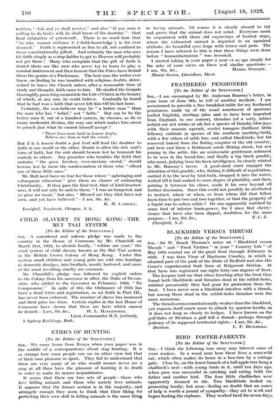FEATHERED PENSIONERS
[To the Editor of the SPECTATOR.] Slit,—I am encouraged by Mr. Anderson Ramsay's letter, in your issue of June 8th, to tell of another incident. I am accustomed to provide a free breakfast-table for my feathered pensioners, made up of the usual assortment of sparrows (called English), starlings (also said to have been imported frOm England, to our sorrow), thrushes (of a sort), robins (which are not robins at all, but a species of thrush), blue-jays with their raucous squawk, scarlet tanagers (brilliant little fellows), catbirds (a species of the southern mocking-bird), with a few others of sable hue, and called blackbirds, but far removed indeed from the fluting songster of the old country, and here and there a Baltimore oriole flitting about, but not joining in the melee, like an aristocratic gentleman ashamed to be seen in the bread-line, and finally a big black grackle, who must, judging from his keen intelligence, be closely related to Mr. Ramsay's raven. A good-sized crust engaged the attention of this grackle, who, finding it difficult of negotiation, carried it to the near-by bird-bath, dropped it into the water, waited till it had soaked to some degree of pliability, and then, putting it between his claws, made it his own beyond all further discussion. Since this could not possibly be attributed to instinct, where or when, or from whom did that fellow learn thus to put two and two together, or that the property of a liquid was to soften solids ? He was apparently watched by some bird of inferior brain-power, for I since find cherry- stones that have also been dipped, doubtless for the same
































 Previous page
Previous page